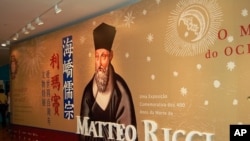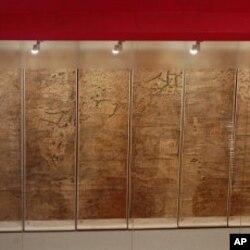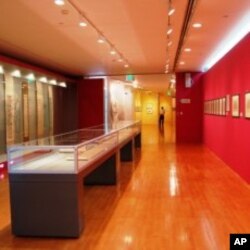An exhibition at the Macau Museum of Art this month celebrates the 400th anniversary of the death of an Italian missionary who became the first Westerner to enter the Forbidden City. Some hope that renewed interest in Matteo Ricci's contributions to China will help ease differences between Beijing and the Catholic Church.
First Westerner in Forbidden City
Matteo Ricci arrived in China in 1583 as a missionary of the Society of Jesus, a Roman Catholic order. By 1601, Ricci, a scientist, had captivated many Chinese intellectuals in the Ming dynasty capital, Beijing, and became the first Westerner to be invited into the Forbidden City.
His mission in China is the subject of an exhibition in Macau, which showcases his works - philosophical texts written in Chinese, a large Chinese-style painting and a 1603 annotated world map, measuring two meters by half a meter.
Shocking world map
Weng Chiao, a curator at the Macau Museum of Art, says when the world map was completed the literati in China were very shocked. She says it was their first time to discover how big the world was.
The exhibition, which has already toured three cities in the mainland, is aimed at raising awareness of Ricci's scientific and cultural contributions to China. It comes at a time when there are signs of cooperation between the Vatican and Beijing on the controversial issue of ordination of bishops.
Before being welcomed in Beijing, Ricci encountered a closed Chinese society, suspicious of foreigners. He was expelled by hostile aristocrats in Zhaoqing and his house in Shaozhou, in southern China, was attacked.
Friendship strategy
Father Artur Wardega, director of the Matteo Ricci Institute in Macau, explains that Ricci eventually found a winning strategy.
"With his dealings with intellectuals and literati men, he put himself to another platform, that he's not coming from a barbarian country," said Wardega. "He dealt on the same level with Chinese and on the level of friendship and he discovered friendship as a very powerful instrument to deal and to be accepted by the Chinese people. After that he was treated not as a barbarian, but like the Chinese."
Able to speak and write Chinese, Ricci began to dress like the Chinese literati and introduced them to Western astronomy and mathematics. Known in Chinese as Li Madou, he also composed music for the emperor Wan Li and sent gifts, although he never met the emperor.
Adapting Christianity
Ricci also adapted Christianity to Chinese culture, such as by officiating rites in Chinese. One of Ricci's converts was Xu Guangqi, a Shanghai-born bureaucrat, mathematician, astronomer and agriculturist. Together they translated Euclid's mathematical masterpiece, Elements.
Xu applied Western farming methods and was tasked by the emperor to reform the Chinese calendar, after he successfully predicted two eclipses. He became known as one of the three pillars of Chinese Catholicism. Xu's calligraphies are also on display in Macau.
Weng says Ricci tried to use a cultural strategy to spread Catholicism, but his cultural legacy in China left a greater mark than his missionary legacy.
Catholics in mainland China today are only allowed to worship in state-sanctioned churches. The Vatican broke off diplomatic ties with China in 1951, after the communist party took over. In July, both the Vatican and Beijing approved the appointment of Bishop John Baptist Yang Xiaoting of Yan'an diocese, a rare event because China and Rome do not normally accept bishops appointed by the other.
Modern day
Yet curbs on Christian activities continue. Last week, about 200 Chinese Christians were reportedly blocked from traveling to South Africa for the Lausanne Congress - one of the biggest gatherings for evangelical Christians worldwide. Many Chinese Christians worship in so-called "house churches" or underground churches.
Father Wardega, a Jesuit, says there are hopes that renewed interest in Ricci in China could help bring about greater understanding between Beijing and the Catholic Church.
"For the people and the Chinese government, Ricci is an important man. For the Vatican, Ricci is an important man," he said. "But Ricci is not enough either for China or for Western countries. Ricci has to be linked with his friends and one of his important friends is Xu Guangqi. For the Chinese Catholics and Western Catholics to have two people, which are the key people from two civilizations is something wonderful and full of hope."
He says efforts have been underway for several years to seek sainthood for Ricci and Xu.
When Ricci died in Beijing in 1610, the emperor gave special consideration for him to be buried there. His grave is on the grounds of the Beijing Administrative College.






